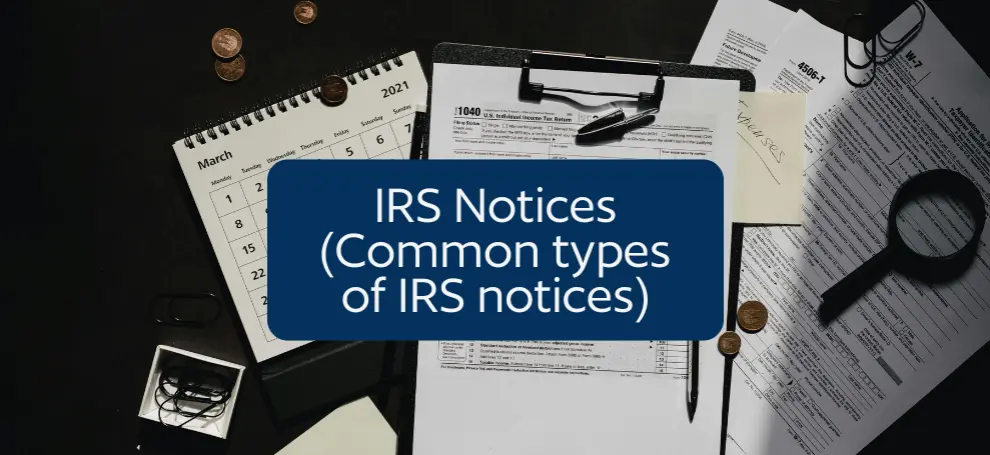An IRS notice letter is an official communication the Internal Revenue Service (IRS) sends to address matters related to your tax filings or account. These letters inform taxpayers about potential issues, changes, or actions required concerning their taxes. Receiving an IRS notice doesn’t necessarily mean there’s a problem, but it does require attention to ensure compliance and avoid possible penalties or additional complications.
What is an IRS notice, and why might I receive one?
An IRS notice is simply a letter from the IRS informing you of something important that may be related to your tax return. It might sound scary, but it’s often just a way to keep you updated or ask for more information.
There are several possible reasons why you might receive an IRS notice, including:
- You have a balance due: The IRS believes you owe additional tax.
- Your refund has changed: Your refund amount is either more or less than you expected.
- The IRS has a question about your tax return: They need clarification or additional information.
- The IRS needs to verify your identity: To make sure you filed the return, not someone else.
- The IRS changed your return: If the IRS found a mistake, they’ll correct it and let you know.
- The IRS needs to notify you of delays in processing your return: There are delays in handling your tax return.
It is important to read the notice carefully and follow the instructions provided to address the issue promptly. Ignoring an IRS notice can lead to further enforcement actions, such as additional interest and penalty charges. (^1^)
What are the most common types of IRS notices?
When the IRS sends you a notice, it doesn’t always mean you owe money. It’s important to understand what each notice is trying to tell you. Here are some of the most common IRS notices:
CP14 Notice
This is one of the most common notices. It tells you that you owe money on your taxes, such as unpaid taxes, penalties, or interest. It’s a simple reminder to pay as soon as possible to avoid more penalties.
CP501 Notice
If you don’t pay after receiving the CP14, the IRS will send a CP501.This notice informs you that you have a balance due on one of your tax accounts.
CP504 Notice
This is your Notice of Intent to Levy from the IRS. If you don’t pay the amount you owe right away, the IRS can take money from your paycheck or bank account, and they can even take your property or state tax refund to cover the debt.
CP2000 Notice
If the IRS thinks you didn’t report all your income, they’ll send this notice. It doesn’t automatically mean you owe money, but it means they want you to review your return. If there’s a mistake, you might owe more taxes.
CP75 or CP75A Notice
These notices mean that the IRS is auditing your tax return to verify certain credits, like the Earned Income Credit (EIC) or Child Tax Credit (ACTC). The IRS will hold your refund until you provide the required documents such as proof of income or dependent eligibility, to confirm your claims.
CP523 Notice
If you received a CP523 notice, it means the IRS plans to terminate your installment agreement because you’ve defaulted on the terms. They are also notifying you of their intent to seize (levy) your assets to collect the unpaid balance.
CP90 Notice
Similar to the CP523, this notice warns that the IRS plans to take action to collect what you owe, such as seizing your property. You usually have 30 days to resolve the issue before they take action.
How should I approach reading and understanding an IRS notice?
When you receive an IRS notice, it is important to approach it methodically to ensure you understand the issue and take the appropriate actions. Here are the steps you should follow:
Step 1: Read the Notice Carefully
- Identify the Notice Type: Locate the notice number, typically in the upper-right corner, to understand the issue.
- Understand the Reason: Notices often explain reasons like a balance due, return changes, requests for additional information, or identity verification.
Step 2: Compare with Your Records
- Review Your Tax Return: Check your original return for discrepancies.
- Check Supporting Documents: Verify the notice details with W-2s, 1099s, or other records.
Step 3: Determine the Required Action
- Follow Instructions: Respond as directed, whether providing documents, making payments, or contacting the IRS.
- Meet Deadlines: Act promptly to avoid penalties or lose appeal rights.
Step 4: Payment Options
- Pay What You Can: If you owe, pay as much as possible. Explore IRS payment plans if needed.
Step 5: Contact the IRS if Necessary
- Clarify Doubts: Call the number in the notice for assistance.
- Report Suspicious Notices: If fraud is suspected, contact the IRS at 800-829-1040 or use the IRS phishing reporting page.
Step 6: Keep Records
- Document Everything: Save the notice, your responses, and supporting documents for future reference.
By carefully reading, comparing records, and responding appropriately to an IRS notice, you can resolve issues efficiently and avoid further complications. (^1^) (^3^)
What happens if I ignore an IRS notice?
Receiving an IRS notice can be intimidating, but ignoring it can lead to severe consequences. It’s essential to understand the potential outcomes to take appropriate action and avoid escalating problems.
- Accrual of Interest and Penalties: The IRS will add interest and penalties to any amount you owe. These charges can grow quickly, making your debt much higher than it originally was. Ignoring the notice means these extra costs just keep piling up.
- Enforcement Actions: The IRS has the power to take action to collect the money you owe. This could include garnishing your wages (taking money directly from your paycheck) or placing a lien on your property (claiming a legal interest in your home or car until you pay the debt). They may also freeze your bank accounts to get the funds.
- Passport Revocation: If you owe more than $62,000 (adjusted yearly for inflation) in unpaid back taxes, the IRS can report you to the State Department, which may lead to your passport being revoked or denied. This means you won’t be able to travel internationally until the debt is cleared.
- Increased Difficulty in Resolving Issues: The longer you ignore the IRS notice, the harder it becomes to fix the situation. The IRS might stop offering easy solutions like payment plans or settlements, and you could be left with fewer options to settle the debt.
- Potential Legal Action: In the worst-case scenario, the IRS could take you to court to get the money. This could result in legal fees, court costs, and even a judgment against you, which could affect your credit and future finances.
To avoid these serious consequences, it is vital to address IRS notices promptly. Review the notice carefully, understand your options, and contact the IRS if needed to explore solutions like payment plans or settlements. Taking action early can help resolve issues and prevent complications. (^4^) (^5^)
What if I lost my notice? Can USA Tax Gurus still help me?
Yes, USA Tax Gurus can help if you have lost your IRS notice. Our team will help you recover the information by contacting the IRS and accessing your tax account or transcripts to determine the problem. Once we have the details, we will guide you on how to resolve the matter efficiently by preparing the necessary response or documentation. Even without the original notice, our experts ensure a thorough approach to address your tax concerns, minimize any penalties, and help you stay compliant moving forward.
What can USA Tax Gurus do to help prevent future IRS notices?
Getting an IRS notice can be stressful, but the good news is it’s often avoidable. At USA Tax Gurus, we ensure your taxes are accurate, complete, and submitted on time.
We focus on every detail, from strategic tax planning to keeping your records organized. We stay ahead of tax law changes, catch mistakes before they become problems, and make sure you stay compliant. If the IRS ever has questions, we step in to handle them for you.
With USA Tax Gurus, you don’t have to worry about errors, penalties, or surprises. We take care of your taxes so you can focus on growing your business. Please click here to connect with us today!
Sources:
Source 1: Understanding your IRS notice or letter
Source 2: Notices
Source 3: Got a letter or notice from the IRS? Here are the next steps | Internal Revenue Service
Source 4: Topic no. 653, IRS notices and bills, penalties and interest charges | Internal Revenue Service
Source 5: Penalties | Internal Revenue Service


